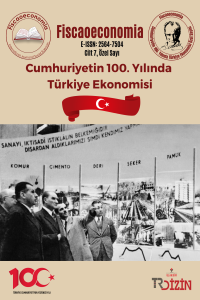Cumhuriyet’ten Günümüze Döviz Kuru Politikaları
Exchange Rate Policies from the Early Republic to the Present
Author(s): Erol Bulut, Göktuğ ŞAHİN2 ŞahinSubject(s): Economic history, Recent History (1900 till today), Economic policy, Financial Markets
Published by: Ahmet Arif Eren
Keywords: Exchange Rate; Exchange Rate Policies; Foreign Exchange Regulations; Volatility; Economic Growth;
Summary/Abstract: In this study, exchange rate policies, which have been one of the significant factors for the Turkish economy since the establishment of the Republic are examined. Additionally, within the scope of the study, exchange rate volatility, as a factor increasing economic sensitivity regarding exchange rates, is considered in terms of its effects on industrial production in the Turkish economy, especially in the period following the official implementation of the flexible exchange rate system in 2001. The aim of the study is to investigate the impact of exchange rate policies and volatility on economic decisions and stability in the first 100 years of the Republic of Türkiye. As a result, it has been observed that Türkiye has faced economic crises due to its foreign exchange deficit, and therefore, it has frequently had to take measures in exchange rate regulations. Conversely, to counterbalance this situation, it is imperative for Türkiye's industry to specialize in the production of high-value-added final goods, to strategically plan policies related to the current account deficit in the long-term, and to address solutions for energy and intermediate goods imports that are both appropriate to the country's conditions and strategically prioritized. In this regard, it is recommended to establish a stable and target-oriented approach in the implementation of sensitive exchange rate policies, leaving no room for errors. Furthermore, based on the analysis conducted within the scope of the study, an inverse relationship between high exchange rate volatility and economic growth has been observed in Türkiye, particularly during certain periods. Among the key economic reasons for this observed relationship in the Turkish Economy are investment uncertainty, fluctuations in consumer spending, the balance of foreign trade, the effects on financial stability, international investments, and capital flows, while the influence of both national and international political conjunctures is also highly considerable.
Journal: Fiscaoeconomia
- Issue Year: 7/2023
- Issue No: spec. 1
- Page Range: 210-238
- Page Count: 29
- Language: Turkish

